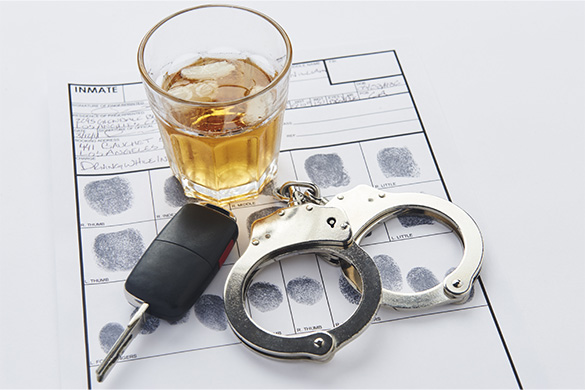Driving while intoxicated carries severe penalties in Texas. If you are facing a DWI charge, do not hesitate to reach out to Underwood & Associates for aggressive and experienced legal representation in your case. Attorney William Underwood has a deep understanding of Texas’s DWI laws. He will work personally with his clients to provide the relentless legal representation they need to defend against their charges.
Who Can Get a DWI?
Texas law prohibits all motorists from operating a motor vehicle if they:
- have a blood alcohol concentration (BAC) of 0.08 or more, or
- are intoxicated by drugs or alcohol.
Generally, an individual is considered "intoxicated" if they lack the normal use of their mental or physical faculties due to ingesting alcohol, drugs, or any other substance. Note that it's also illegal to operate a boat while intoxicated (BWI) or an airplane while intoxicated (FWI) in the state.
Texas also has "zero tolerance" laws that make it illegal for those under 21 years old with any detectable alcohol in their system to operate a motor vehicle.
Call Underwood & Associates today at (214) 544-8040 or contact us online to schedule a meeting and learn more about the DWI penalties in Texas!
What Are the Penalties for DWI?
DWIs are expensive and inconvenient. Those convicted of DWI could face a range of penalties from steep fines to driver’s license suspension. The penalties vary based on the circumstances of the case, but the range of allowable penalties depends mainly on how many prior convictions the offender has:
First-Offense DWI
First-offense DWI penalties include:
- 72 hours to 6 months in jail (12-month maximum for those with a BAC of 0.15 or more)
- Up to $2,000 in fines (or up to $4,000 with a BAC of 0.15 or more)
- License suspension for 90 days to 12 months
- Ignition interlock device (DLD) if they obtain an “occupational license”
Second-Offense DWI
Second-offense DWI penalties include:
- 30 days to 12 months in jail
- Up to $4,000 in fines
- License suspension for 180 days to 2 years
- DLD for 1 year if they have a prior conviction within 5 years
Third-Offense DWI
Third-offense DWI penalties include:
- 2 to 10 years in the penitentiary
- Up to $10,000 in court fines
- License suspension for 180 days to 2 years
- DLD for 1 year if they have a prior conviction within 5 years
When is a DWI a Felony in Texas?
If you were found to have a passenger under the age of 15 while driving while intoxicated, you could face a felony charge carrying up to $10,000 in fines and a jail term of 180 days to 2 years.
Also, note that the consequences of driving while intoxicated could impact the rest of your life. If you have been charged with intoxicated manslaughter (DWI causing death on the road), you face a second-degree felony punishable by up to $10,000 in fines and 2 to 20 years in jail.
Texas Implied Consent Law
Texas also has “implied consent” laws that require all drivers lawfully arrested for a DWI to submit to a blood or breath test. Those who refuse the test will face a license suspension of 180 days for a first offense and two years for a second or third offense.
Furthermore, the Department of Public Safety also has the authority to suspend or revoke your driver's license or driving privileges after an opportunity for a proper hearing if you:
- fail to complete a DWI education program within 180 days (if completion is a term of probation upon conviction of DWI);
- fail to complete a repeat offender alcohol education program as required when convicted of DWI; or
- fail to complete a drug education program as required upon conviction of a drug-related charge.
DWI for Minors
Texas implements strict DWI laws aimed at minors, such as the “zero tolerance” law mentioned earlier, to persuade even the youngest drivers to build good driving practices from the get-go. If you are under 21, you will receive an automatic suspension of driving privileges for convictions or failure to comply with the following Alcoholic Beverage Code offenses in Texas:
- Minor in possession
- Attempt to purchase alcohol by a minor
- Purchase of alcohol by a minor
- Consumption of alcohol by a minor
- Misrepresentation of age by a minor
- Driving under the influence of alcohol by a minor
- Failure to complete a court-ordered alcohol awareness class
Reducing a DWI Charge to a “Wet Reckless”
In some cases, you could reduce your DWI charge to a “wet reckless,” a reckless driving offense involving drugs or alcohol. Generally, reckless driving carries less severe penalties than a DWI charge, so a wet reckless plea deal typically means lower fines and less potential jail time than a standard DWI.
Generally, prosecutors are only willing to offer a wet reckless in cases with certain significant mitigating factors, such as:
- it is the person’s first DWI offense
- the person has no criminal record
- the individual had a low blood alcohol concentration (BAC).
On the other hand, aggravating factors usually diminishes your chances of getting a wet reckless plea deal, such as if your case involved an accident and injuries. Note that a wet reckless charge will still be a prior DWI on your record.
Start Your Defense Today
If you have been charged with DWI, contact a lawyer immediately. When arrested, one of your fundamental legal rights is to remain silent to avoid self-incrimination, as anything you say can and likely will be used against you in court. Let an experienced DWI law firm in Collin County do the talking for you. Underwood & Associates can fight for you in and out of court and protect your best interests as a driver.
Contact Underwood & Associates today to schedule a consultation and learn more about the DWI Laws in Texas!




